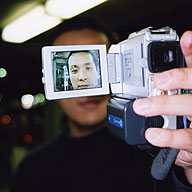An Interview with Murakami Kenji
Holding a Camera Can Suddenly Make Things Interesting

Q: The structure of your piece was well thought out, but what kinds of narrative devices did you use?
MK: I thought through the structure very precisely in advance, drawing on several films that I’d seen before. The first half is “recollection,” and the second half covers events from a particular day. This also serves as an explanation of my ideas on documentaries, but in my mind a documentary is something where you can see the existence of the person behind the camera. By being able to see their existence, I mean that the shooter’s person and shape seep through. Documentaries are often compared as being fictional or real, but I think it’s a mixture of the two, not a 100% or 0% ratio. I try and create a blank space for things to traverse between them both. The situation of having a camera there is already an unreal situation. The most important thing for me is whether the things that develop there are interesting or not. I’d like to be continually traversing between fiction and the real.
Q: I felt like your piece is a message to aspiring filmmakers saying “don’t let your curiosity run dry!” while also conveying the appeal of Kawaguchi City.
MK: I teach at a technical school, and I’m often asked “How can I make an interesting piece?” My reply is “The only thing you can do is be an interesting person yourself.” However, doing things like getting drunk and jumping into a park fountain will definitely not make you into that interesting person. Most people regarded as directors in the world at large shoot solely because they have the desire to tell other people about something interesting that caught their interest. Being an author comes down to whether you can talk about and show what you’ve felt in an interesting way. Just living randomly is boring. Because for those of us with the desire to tell our stories, holding a camera can suddenly make things interesting.
Q: What is behind the title of this piece?
MK: I think making this piece was like being encouraged, or being told “survive!” There was also the idea of wanting to have the piece tell me “survive!” and not just me saying it to the audience.
Q: At the end during the 8mm shooting it seems like you are saying something, but what is it?
MK: It’s a secret, because I think it’s better to have a secret of some kind in a film. I’d be happy if you try thinking up something on your own.
(Compiled by Kotani Mayo)
Interviewer: Kotani Mayo
Photography: Kotani Mayo / 2003-09-27 / in Tokyo
